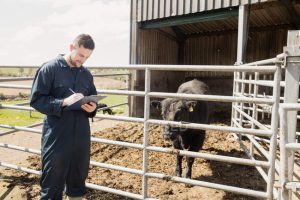Jobs Openings At RMSJ – Foothills, AB
Location: 271 Attwell Drive, Etobicoke M9W 5B9
Job Types: Full-time, Part-time
Salary: $15.00-$20.00 per hour
Expected hours: 4 – 8 per week
Job Title: Barn Worker
Landmark Farms, located at Fordville Farm just South West of Calgary, AB is looking for a responsible and reliable individual to join the team.
Duties include (but are not limited to) basic daily chores such as turn out, turn in, stall cleaning and feeding. Looking for an individual to work weekend mornings and a couple weekday shifts. This is a great opportunity to be on a fantastic team with passionate horse people.
Benefits:
- Casual dress
- Extended health care
- On-site parking
Flexible Language Requirement:
- French not required
Schedule:
- Monday to Friday
- Morning shift
- Weekends as needed
- Weekends only
Ability to Commute:
- Foothills, AB T1S 3G7 (required)
Work Location: In person
JOB REQUIREMENTS
The successful candidate will need the following experience and skills to be successful in this role:
- Calving experience and general farm duties (lambing experience not necessary)
- Feeding, watering & monitoring animals
- Comfortable working with large and smaller animals
- Ability to lift 25 kilograms
- Labor and maintenance experience
- Ability to work flexible schedules and independently
- Ability to work independently
- Ability to work in unpredictable weather conditions
What skills and qualities are important for a Barn Worker?
A barn worker plays a crucial role in the care and maintenance of animals, especially on farms or in equestrian settings. The job involves various tasks related to the well-being of animals and the overall operation of the barn. Here are some important skills and qualities for a barn worker:
Animal Handling Skills:
- Ability to handle and care for various animals, such as horses, cows, goats, or other farm animals.
- Understanding animal behavior and being able to respond appropriately.
Physical Stamina:
- The job often involves manual labor, including lifting hay bales, cleaning stalls, and other physically demanding tasks. Good physical fitness is essential.
Attention to Detail:
- Keen observation skills to notice signs of illness or distress in animals.
- Thoroughness in performing tasks like cleaning and maintaining the barn environment.
Teamwork:
- Collaborative attitude to work well with other barn workers, veterinarians, and farm owners.
- Communication skills to convey information about animal health or other relevant concerns.
Knowledge of Animal Nutrition:
- Basic understanding of the nutritional needs of different animals and the ability to follow feeding schedules.
Overall, a successful barn worker should possess a combination of practical skills, physical fitness, and a positive attitude towards animals and teamwork. Continuous learning and adaptation to the specific needs of the animals and the farm are also essential in this role.
What education and certification are required to become a Barn Worker?
Formal education requirements for a barn worker can vary, and many individuals gain the necessary skills through hands-on experience and on-the-job training. However, certain educational backgrounds and certifications can enhance one’s qualifications for the role. Here are some considerations:
High School Diploma or Equivalent:
- While not always a strict requirement, having a high school diploma or GED is generally beneficial. It demonstrates basic educational attainment and may be preferred by some employers.
Agricultural or Animal Science Courses:
- Courses in agricultural science, animal science, or a related field can provide foundational knowledge about animal care, nutrition, and farm management.
On-the-Job Training:
- Many barn workers gain practical skills through hands-on experience. Entry-level positions often provide training under the supervision of more experienced staff.
Certifications:
While not always mandatory, certain certifications can enhance a barn worker’s qualifications. Some relevant certifications include:
- Equine Care and Management Certifications: Offered by organizations like the Certified Horsemanship Association (CHA) or the British Horse Society (BHS).
- Livestock Handling Certifications: Available through agricultural extension programs or organizations focused on farm animal care.
- Basic First Aid and CPR Certification: Useful for emergency situations.
Volunteer or Internship Experience:
Volunteering or interning at farms, stables, or agricultural facilities can provide valuable hands-on experience and make a candidate more appealing to employers.
Specialized Training Programs:
- Some vocational or technical schools offer programs specifically focused on animal care, farm management, or related subjects. These programs can provide a more structured educational foundation.
- It’s important to note that the specific requirements for barn worker positions can vary depending on the employer, the type of farm or facility, and the nature of the work involved. Employers often prioritize practical skills, experience, and a genuine passion for working with animals.
Individuals interested in pursuing a career as a barn worker should check job listings for specific requirements and preferences of potential employers. Networking within the agricultural and equestrian communities can also provide valuable insights and opportunities for gaining experience in the field.
Who can apply to this job?
The employer accepts applications from:
- Canadian citizens and permanent or temporary residents of Canada.
- Other candidates with or without a valid Canadian work permit.
How to apply
Online: Apply On Company WebSite
What is the work environment like for Barn Worker?
The work environment for a barn worker can vary based on the type of farm or facility, the specific animals being cared for, and the overall scope of responsibilities. However, there are common elements that define the work environment for many barn workers:
Outdoors:
- Much of the work is conducted outdoors, exposing barn workers to various weather conditions. This can include extreme temperatures, rain, snow, or heat, depending on the geographic location.
Physical Labor:
- The job involves a significant amount of physical activity, including lifting hay bales, mucking out stalls, cleaning equipment, and performing other manual tasks. Good physical fitness is essential.
Animal Interaction:
- Barn workers spend a considerable amount of time interacting with animals. This includes feeding, grooming, exercising, and providing general care. Understanding animal behavior is crucial for maintaining a safe and positive environment.
Routine Tasks:
- Daily tasks often include feeding and watering animals, cleaning stalls, maintaining barn cleanliness, and administering medications or treatments as needed. Establishing and adhering to a routine is a common aspect of the job.
Farm Equipment:
- Barn workers may use various types of farm equipment, such as tractors, wheelbarrows, pitchforks, and other tools. Familiarity with and the ability to operate this equipment is often required.
While the work environment for barn workers can be physically demanding and may involve exposure to various elements, many individuals find it rewarding due to the close connection with animals and the satisfaction of contributing to the overall well-being of the farm or facility.







